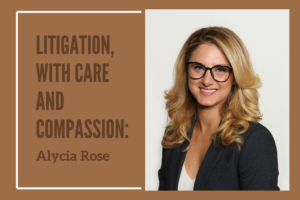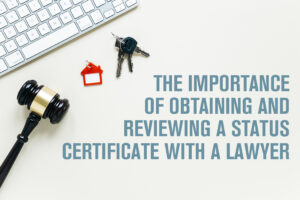REAL ESTATE LAW
Neeraj Pal: Heart of the Community
Neeraj Pal is a new Canadian lawyer who practices corporate commercial, real estate and civil litigation law. His focus is on easing the burdens of his clients and helping with complex legal matters.
Neeraj Pal was born and raised in India. Before coming to Canada in 2017, Neeraj was a lawyer in India for 16 years. He worked as in-house counsel for ESPN, Vodafone, Viacom and Times Network in India. In Canada, he is a sole practitioner that focuses on corporate commercial, real estate and civil litigation.
The Beginning
Neeraj didn’t always want to be a lawyer. There were a few lawyers and judges in his extended family and to his limited child perception, they led rather boring lives. “I wanted to be someone who was free-spirited, doing their own thing,” he said. The trouble was, he wasn’t quite sure what it was that he wanted to do. No matter, he thought. He would start the track to become a lawyer to keep his parents happy and to give himself time to figure out where his true passion lay. He took the law school entrance exam, got into law school and realized with a mild shock that he loved it. Soon law became his passion. “I realized how amazing it is to search [for] new things, do research…fight a case…get a confirmatory result… And I was good at it,” he said with a twinkle in his eye.
At one point in law school he had the opportunity to argue a case in a simulated court environment. He prepared his case law and his arguments, practiced his delivery. During his presentation, he was so wrapped up in his arguments that he didn’t realize he had gone beyond the allotted time. It didn’t seem to matter though, because when he was finished, his classmates were on their feet and showering him with applause. “[It was] such an amazing feeling,” he said. “I thought, if I can do it here, maybe I can do it somewhere else.”
Neeraj was called to the bar in India in 2001. He worked as a junior lawyer assisting a senior counselor in research, court appearances, documenting reviews and time management. During his next job at ESPN, he decided to do his Master in Laws in London, England. After his Masters, he was rehired by ESPN. Later on, he got an opportunity to be part of the Viacom’s dynamic legal team. Before heading to Canada, he was taking care of the legal and regulatory functions at Times Network, where he was dealing with serious techno-commercial agreements for the online and broadcast media business. Neeraj enjoyed the work and the team-based environment. When he and his family came to Canada in 2017, he contemplated returning to the same type of in-house environment but ultimately decided it was time to try starting his own practice, something he had wanted to do for awhile.
Coming to Canada
Neeraj took his accreditation exams while still in India so that when he arrived in Ontario, he was able to start the process to be licensed. He wrote his Barristers and Solicitors exams, completed his articling with Brampton Legal Community Clinic and was called to the bar in June 2019. He opened Gretis Legal in November 2019.
Neeraj focuses on corporate commercial and real estate civil litigation. In corporate commercial cases, he helps his clients incorporate a business, establish business practices, and develop employment agreements. In real estate, he focuses on sale and purchase transactions. In civil litigation he does personal injury claims and accident benefit claims.
Out of all the types of law, Neeraj has always been drawn to corporate commercial cases. It’s why he worked as in-house counsel in India. He feels a sense of kinship when many people are working together towards a common goal, to produce a product of the highest quality. And although he no longer works for a large company, he tries to bring that sense of ownership and partnership to the cases he works on with his clients. Real estate is his second area of interest. He finds it’s a way to stay connected to the community, give back to it, and stay in touch with the people within it, which is very important to him.
Third, Neeraj does civil litigation for personal injury claims and accident benefit claims. He finds litigation intriguing because he must stay active and updated on caselaw as it can change overnight. It’s a way to help people with their rights, making sure they get their share of things.
When asked what he’s most proud of, he gave a surprising answer. Neeraj said that the easy answer would be graduating from law school or passing the bar both in India and in Canada. He acknowledged that they are impressive accomplishments and he is proud of those moments, but to him, his proudest achievements are learning to knot his tie, learning how to swim as an adult, immigrating to a new country and starting all over again, and of course learning to drive on the other side of the road. He had to really work hard to overcome his fear (swimming) and years of trained instinct (driving) to succeed, which he did, and he’s beyond proud of those victories.
Choosing Wolf Law Chambers
After deciding to start his own practice, he began looking for an office space. Through a Google search, he found Wolf Law Chambers. He called and made an appointment for a tour. “They were very welcoming, and I was very impressed with the space,” he said. “I have worked most of my professional career in an environment where everybody has their own space but there is room to help each other. I wanted something similar. I never realized it would be available, but I saw [it] here.” When he checked it out, he knew he wanted an office at Wolf Law Chambers for himself. “The infrastructure is good, [there’s] 24/7 access and the coffee is great,” he added with a laugh. He noted that the clients who visited his office were very impressed. They liked the layout and the air of professionalism. The location is also a bonus as it’s pretty central in terms of reaching different parts of the GTA.
As a tenant of Wolf Law Chambers, he’s really impressed with the use of technology and how it’s been incorporated into office use. “They have enabled it to become your personal assistant,” he said. He can get his voice messages by email; he knows when he has mail or a parcel to pick up. He receives faxes electronically, negating the need to physically pick up the fax and then scan it himself. He can book the conference room online. “Technology has been used very positively, which is good because it can bring down efficiency [but not here], here it is used very nicely.” Too often, you don’t realize you need something until the need arises, but time and again, Neeraj has found his needs anticipated and fulfilled before he can voice them.
Looking forward
Short term, Neeraj would like to keep his practice running and keep learning about the Canadian system. Long term, he would like his practice to evolve into a big firm that has lawyers specializing in different areas, and for his practice to be heavily involved in the community. He also wants to create his own Bay Street. He sees a lot of good talent coming from outside Canada that could be utilized. He thinks it would benefit the community and be good opportunities for the incoming lawyers. “Not everyone can go to Bay Street after all, so why not make one right in the heart of my community?” he asked.
At the end of the day, his favourite part of being a lawyer is when he’s able to put a smile on his client’s face. When they’re able to walk out of his office satisfied and smiling, he’s happy. “Whatever it takes to make that happen,” he says, “I will do.” That smile is the best feeling of satisfaction.
If you would like to ease your burdens and smile, give Gretis Legal a call.
Litigation, With Care and Compassion: Alycia Rose
Alycia Rose of A. Rose Law specializes in civil litigation. She was called to the bar in 2017. After working for a couple of years for a few firms, she decided that she wanted the freedom and autonomy that comes with running her own practice.
In late 2019, she incorporated and started A. Rose Law. Her cases in civil litigation focus on property disputes that include real-estate, construction liens, breach of contract and debt repayment.
Background
Before doing her undergrad, Alycia worked part time in a hospital. She worked in almost every department, learned a lot of medical jargon and even gained the ability to read doctors’ handwriting. Sheenjoyed the work and considered continuing there after school, but the desire to be a lawyer had always simmered in the back of her mind. She decided to take the plunge and go to law school. She did her research and chose the University of Leicester in England. She liked the idea of learning law from multiple jurisdictions. Within the first couple of weeks, she knew she had made the right decision. Law was her true love.
At the end of law school, Alycia came back to Ontario; she did a Masters degree in Law before being called to the bar. From her time working at the hospital, Alycia knew that she wanted to work with people who’d been affected by injury, illness, disability and mental issues, so she took a job at a personal injury law firm. The work was rewarding. While she was there, she got a lot of litigation exposure and found she really enjoyed it. Each case was different, there was a lot of interaction with clients and she loved going to court. She enjoyed the thrill of it, the nervousness as well as arguing and trying to prove a point.
So, she decided to branch out further into litigation. Her next job was at an insurance defence firm, where she mainly focused on cases within the scope of property damage. Over time this evolved and led to civil litigation which is where she spends most of her time now. She also does real estate and construction liens and has continued with some personal injury cases as well.
Be Healthy and Happy
One of her goals in life is to focus on being healthy and happy both physically and mentally. She wants the same for her clients. The common denominator from her time at the hospital and her career as a lawyer is that both jobs focus on helping people in times of emotional and physical distress. All her life she’s been the person people come to for help and advice and she likes doing that, being there for friends and family. She wants to be able to do that for her clients as well as they go through events that are emotionally charged and painful. When clients come to her with their problems, she is dedicated to taking the stress away and putting it on herself. She’s ok with that. She’s trained for that. She has the resources and the knowledge to navigate the issues they’re dealing with, and at the end of the day she’s helping someone. “I’m a compassionate person and I put myself in the shoes of other people and empathize with what they’re going through,” she says. If she has the ability and the means, it seems to her a waste not to help people.
The Limitation Period
Litigation covers all manner of cases but the most important issue is the limitation period. The fact that there’s a general two-year limitation period within which people can file a claim is not well-known. “That’s probably the most important thing I do,” she says, “because most of the time people don’t know they’ve only got two years.” It’s not uncommon for people to come to Alycia really close to the deadline or sometimes even too late. To make things even trickier, sometimes it’s difficult to decide when the date of loss was, when exactly the limitation period countdown clock started ticking.
No matter when a client comes to her, that clock regulates what she can and cannot do to preserve that client’s rights and whether or not they’ve been precluded from pursuing those rights. It’s not a very lenient piece of legislation, she admits. But when asked if that was the end of the line and there was nothing to be done after a limitation period expired, she said, “It depends on the case. There may be a way to fight it even if the deadline passed.” There are things that can be done, limited options that have no guarantee of working but she’s willing to try for her client’s rights.
The thing she wishes everyone did was as soon as they realized something was wrong, was make a call for a consultation even if it’s just to find out what the limitation period is. Although the general limitation period is 2 years, others are much shorter, some are even 10 days. “It’s important to call and ask what do I need to watch out for if this incident develops into something bigger,” she says.
Choosing Wolf Law Chambers
Becoming a sole practitioner can be daunting, even more so when you’re a young lawyer. “You suddenly wear all these hats, not just lawyer, but also, accountant, manager, marketer, advertiser, customer service representative, IT technician…” Alycia says, “but nothing compares. It’s awesome.” Despite the risk of setting out on her own, Alycia is proud of herself for taking the leap.
When looking for an office to base her own practice out of, Alycia started her search with Google. Out of the several options that popped up, one was Wolf Law Chambers. She made an appointment with the owner, Dezso Farkas, and the Marketing Director, Isabel Alves. “I loved Dezso and Isabel. I really felt like I would be taken care of and respected. I felt that my career would flourish with the support that it seemed that they would be able to give me. And so far I haven’t been wrong,” she says.
She liked the location; it was central for her clients and easily accessible being close to the highway. She also liked that there was a second location in Oakville which she has access to. “Both offices are beautiful, especially the boardroom. Clients are always commenting on it.” As a litigator, Alycia is either serving someone or being served. She laughs. “It sounds insignificant, but it’s all I do.” So having a receptionist available to receive packages and a process server available, as well as a courier system in place is exactly what she needed. Once she settled in, the biggest thing that stood out was that there was a sense of community and collaboration, not competition which she appreciates. Working out of Wolf Law Chambers gives her the flexibility to work from home or from her Chambers office while still being able to work collaboratively. “It goes back to my goals: have a good work life balance and [Wolf Law Chambers] is the way to do it,” she says.
If you’re facing litigation, if you’re facing a property dispute, if you have a question about the limitation period of your case, give Alycia a call.
The Importance of Obtaining and Reviewing a Status Certificate with a Lawyer
It is not information itself but how we use it that defines our prudence. An overload of information will lead to poor decisions, despite any lucky benefits, since too much information is equivalent to no information, and any decision based on no information cannot be prudent but only speculative. The same can be felt by the lay potential buyer of a condominium unit who obtains a Status Certificate for determining whether to buy a unit for residence or for investment. Reviewing a Status Certificate may seem like information overload to someone who has not been trained for such a task. Thus, in such circumstances, the best approach may be to consult a lawyer who is knowledgeable of the nature and implications of the Status Certificate’s contents, for they would know how to use the information provided in the document.
Status Certificate
A Status Certificate is a document which provides potential buyers with the current legal and financial “status” of a condominium unit along with some information about the condominium corporation, which is made up of owners of the condominium. It a snapshot of the corporation and unit’s position at a given time.
A document analogous to the Status Certificate is the Annual Report of a public corporation, which contains financial statements, ongoing legal matters, and other sets of information which give potential investors a clearer picture of the business of concern. Potential investors, who are looking to be shareholders or creditors, would look to this Annual Report to gather the insights they need to make a smart investment decision. Unfortunately, not everyone knows what to look for when analyzing the Annual Report; and not everyone knows what to do despite having the necessary information in front of them.
Similar can be said to the potential buyer of a condominium unit. Upon request to the condominium corporation which owns the unit of concern, the corporation will give the requester a Status Certificate, with a specified date, containing the information listed under section 76 of the Condominium Act. The main elements of the document can be stated as follows:
- The Scope of the Unit;
- The Budget and Financial Status;
- Any Ongoing Legal Proceedings;
- Rules, Regulations, and Restrictions; and
- Insurance Requirements for owners.
Scope of the Unit
It is important for every potential buyer to consider what the unit of concern entails. Does it come with a parking unit; or perhaps a locker? The Status Certificate will confirm the legal description of the unit, including lockers or parking units. This can be important for consideration, as in some cases parking units or locker units are not owned but are instead used by the seller. Only a careful review of the Status Certificate and accompanying documents will confirm just what the seller owns and what exclusive rights are transferable to the buyer. Once confirmation is made, the potential buyer can be one step closer to being a prudent buyer.

Budget & Financial Status
The Status Certificate provides the potential buyer with the common expenses of the respective condominium unit. The document also provides any increases to the common expenses for the unit that the board has declared since the current fiscal year’s date of the budget of the corporation, along with reasons for such change, pursuant to section 76(1)(b) of the Condominium Corporation.
Moreover, while common expenses of the past are important for consideration, reviewing the current budget will also shed some light into the budgeted expenses for the condominium corporation as a whole, which provides valuable insight to the potential buyer regarding the corporation’s financial priorities for the future. It might also provide an intimation to how well the condominium corporation manages the business and its units.

In addition to the common expenses and budget, the reserve funds can provide some interesting information. In essence, it is a special account from a financial institution (i.e. bank) which is separate from the condominium’s operating fund. This special account would be used for major repairs and replacements within the condominium units. It is analogous to an emergency fund. Reviewing the reserve fund can be important for the potential buyer because, supposing the potential buyer one day becomes the new owner of the unit of concern, the answer to whether the condominium corporation can quickly repair or renovate as required may vary depending on the amount of money kept in the reserve fund. Without proper consideration of the implications of the particular amount of monies held in the reserve fund, it can be quite difficult to make a prudent purchase of the condominium, for the reserve fund analysis can be crucial when determining whether the purchase of a condominium unit was worth its price.
Legal Proceedings
The main questions regarding legal claims is quite simple: is the condominium corporation involved in any legal proceedings before the court, arbitrator, or administrative tribunal? Are there any judgments outstanding? What about liens or special assessments? Answering these questions can reveal any red flags that the potential buyer should be aware of before signing the purchase agreement. All legal questions should be pointed to answer to the ultimate question of whether the purchase of a particular condominium would be prudent. This is best achieved by consulting a lawyer.
Rules, Regulations and Restrictions
The question of whether the corporation has faced or is facing material legal problems can be followed by the question of whether there are any laws that unit owners must follow during their time of ownership. This would be very important to know before making any purchase, since such rules and regulations may constrict the intended behaviours of future unit owners. For example, a potential buyer could have purchased a condominium unit for the sole purpose of renting out the space to tenants. However, if the rules of the condominium corporation dictate that there shall be no tenants, then the purpose of the purchase is rendered meaningless, though the term against tenancy may be enforced under contract law.
Furthermore, suppose the potential owner has a pet dog. It would be quite important for the potential buyer to know the restrictions on keeping pets within the respective unit, notwithstanding whether such restriction is based on animals, breed, size or something else. Thus, a thorough review of the rules disclosed through the Status Certificate would provide the potential buyer with the information to properly determine whether their intended use for the property of concern would comply.
Insurance Requirements
Needless to say, insurance is important; and a brief review of the condominium declaration can provide clarification to the potential buyer on the insurance coverages that a current owner is required to obtain. Typically, a condominium corporation maintains comprehensive insurance for the building and its common elements. However, unit owners are often required to obtain coverage for their personal property, and for liability relating to incidents within the purchased condominium unit. Discussing these insurance requirements with an insurance agent during the conditional period will allow a prospective buyer to determine whether they will be able to obtain the required coverage and associated costs.
Concluding Remarks
Not everyone knows what to look for when analyzing the Status Certificate; and not everyone knows what to do despite having the necessary information in front of them. It is not enough to obtain and review complicated information alone, just as it is not enough for the lay reader to understand the implications of the information written in an Annual Report or a medical report. Someone reviewing an Annual Report would be prudent in seeing an expert in Accounting, Finance or Law. Someone reviewing a medical report would be prudent in consulting a doctor. Likewise, the potential buyer of a condominium unit would be prudent in reviewing the Status Certificate with an expert in the field of Real Estate Law. Thus, seeking consultation with a lawyer on the Status Certificate can be the best approach in making a well informed prudent purchase of a condominium corporation, whether it be a new home or a new investment.
-Aaron Rajesh



